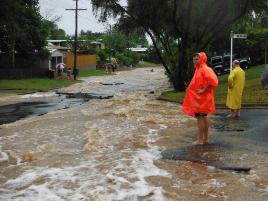Extreme weather of 2011 'didn't dampen holiday plans'
Published on 18 April, 2013
CQUniversity research has shown that the 2011 floods and other extreme weather events in Queensland did not have a major impact on the holiday plans of most Brisbane residents.
This research by Dr Jill Windle and Professor John Rolfe, supported by a University Merit Grant, was published in the Australasian Journal of Environmental Management.

Dr Jill Windle and Prof John Rolfe
After the summer of 2010/2011 was characterised by extreme weather events* in Queensland, the authors surveyed Brisbane residents, who are an important source of domestic tourism in Queensland. Approximately 70% of overnight visitors in the State are local residents, and Brisbane is the largest population base in the State.
"A survey of Brisbane residents found that the holiday plans of 84% of survey respondents were unaffected by the 2011 weather events," Dr Windle says.
"Those affected were more likely to change the timing of their holiday (avoid the wet season) rather than change their destination.
"This means the impact on tourism operators, from the Brisbane market, would have been relatively low. This should be an encouraging finding for tourism operators as it might result in more activity outside the peak season of school holidays. It also implies that if climate change does result in increased frequency of extreme weather events in the summer season, then the impact on domestic tourism within Queensland might not be as great as some tourism operators anticipate."
* In late December 2010 and early January 2011, heavy rainfall produced a series of floods across the State. Three quarters of the State was declared a disaster zone and many thousands of people were evacuated from their homes. Brisbane city experienced the worst floods since 1974. Three cyclones crossed the coast; including the category 5 Cyclone Yasi. These events had a devastating impact on the tourist industry.


